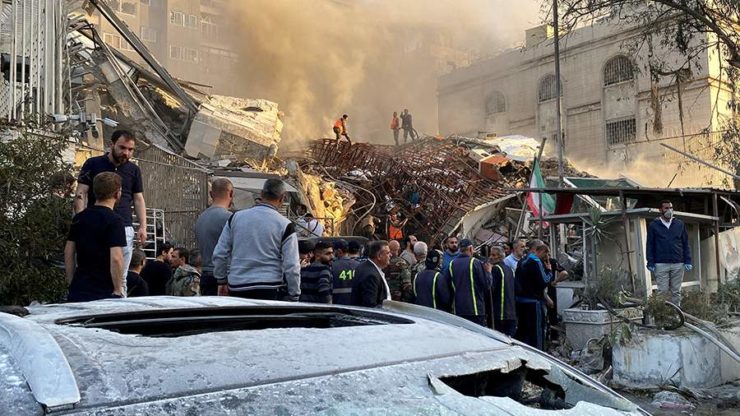
On 1st April 2024, Israel conducted brazen missile attacks on the embassy of the Islamic Republic of Iran in Syria. These attacks have further compounded the already intensified relationships between the two countries. Analysts and leaders around the world have already been warning that Israel’s genocidal campaign in Gaza could engulf more than just Palestine. However, the United States and its other Western allies have remained in oblivion to the menace of Israel’s indiscriminate bombing in Gaza since October 7, 2023. They have been supporting Israel unequivocally since the commencement of the war. Israel has received economic and military aid from the United States, the UK, and other Western nations to bomb the civilians in Gaza.
13 individuals have been killed in the recent Israeli attack on the Iranian embassy in Damascus. Although Israel has not accepted responsibility for these attacks, media outlets around the world and some Israeli officials, while maintaining anonymity, have confirmed that these attacks were conducted by Israel. Some important Iranian officials, including five military aides, have been killed in these airstrikes. In response, Iran has vowed to revenge these attacks. Israel has always assumed Iran as one of the major threats to its existence and sovereignty. Most of the pro-Palestine proxy groups fighting the atrocities of Israeli forces in Gaza are backed by Iran.
Israel and its Western allies have accused Iran of providing military and intelligence support to Hamas in its October 7 attacks on Tel Aviv. Iran has been widely criticized by the United States and many other Western countries for its backing of the Yemeni Houthis, as the group has been targeting Israel-bound ships since the outbreak of the Israel-Hamas war. However, Iran has never been involved in a direct confrontation with Israel or its allies, nor does it want to.
The recent attacks on the Iranian embassy seem a trap against the Iranian leadership. Netanyahu is facing immense pressure at home. Since the outbreak of the war, he has been accused of prolonging the war for to evade the corruption charges against him. Families of the hostages taken by Hamas are also accusing him of deliberately avoiding a ceasefire to perpetuate his government. Recent Israeli attacks on the Iranian embassy bolster these allegations. In the past, Israel has conducted several proxy attacks against Iranian officials and its interests inside the country and in the Middle Eastern region.
However, targeting a diplomatic premise has triggered a new catastrophe in the Middle East. Diplomatic premises have been awarded special protection from attacks even during the wars under the Vienna Conventions on Diplomatic Relations (1961) and the Convention on Consular Relations (1963). Host countries hold no right to intervention inside an embassy without permission from the diplomatic staff. According to Article 22 of the Vienna Convention on Diplomatic Relations, “The premises of the mission shall be inviolable. The agents of the receiving State may not enter them, except with the consent of the head of the mission. The receiving State is under a special duty to take all appropriate steps to protect the premises of the mission against any intrusion or damage and to prevent any disturbance of the peace of the mission or impairment of its dignity.” These laws grant impunity to Diplomats from prosecution in the receiving country. Moreover, these protections granted by the Vienna Convention remain valid even if the host country breaks off diplomatic relations with the other state.
Israel stands accused of violating these conventions by attacking the Iranian embassy in Syria. Iranian nationals are taking it as an attack on Iranian soil. Therefore, pressure is mounting on the Iranian officials to retaliate against Israel. Iran has even accused the United States of being equally responsible for these attacks. However, the latter has refuted these allegations. Washington has said that it had no prior warning or information about the attack. Israel’s attack on the Iranian diplomatic enclave has sparked threats of an imminent widespread war in the Middle Eastern region.
Iran is ensnared in a precarious predicament, and Netanyahu stands victorious under any possible outcome of these attacks. A direct retaliation will lead the nation into a direct war with Israel and the United States. Netanyahu will accomplish his ambition of perpetuating his rule. However, the region will witness a new apocalypse. A possible war between Iran and Israel holds the potential to extend beyond just the Middle East. The impacts of this war will be felt globally, as international trade will face a severe blow. The chances of a direct war between Iran and Israel are meager, as Tehran seeks no direct involvement in a war with any country. Attacks near Haifa Airport and Israel’s naval base in the city of Eilat, on the Red Sea port, portend that proxy attacks on Israel and its allies in the region will increase.
Taut Bataut – is a researcher and writer that publishes on South Asian geopolitics, exclusively for the online magazine “New Eastern Outlook”.